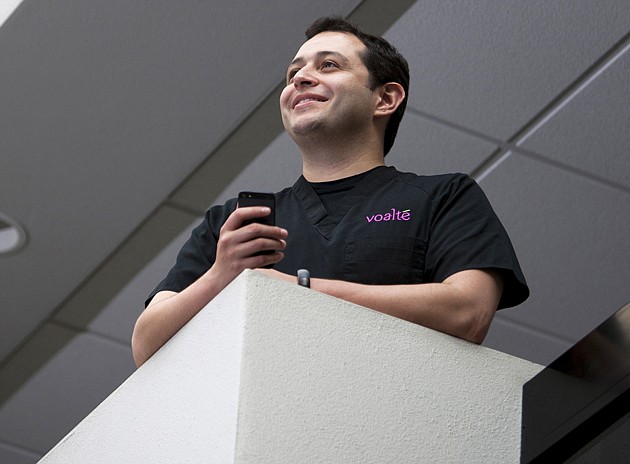- November 25, 2024
-
-
Loading

Loading

The path Voalte took to become a creative destructor in the mobile health care communications industry was initially a disadvantage.
That's because the Sarasota-based firm, which uses smart phones to allow nurses and hospital employees to communicate with each other, was way ahead of its time, Voalte President Trey Lauderdale says. Most of the clients it targeted for business — hospitals and medical centers — weren't ready to make such a seismic shift in 2009 and 2010, when the firm was a startup. Even today, some hospitals cling to a 1990s form of internal communications: beepers and pagers.
Says Lauderdale: “We were too early in a laggard market.”
That hitch, however, is no longer a weakness.
In fact, Voalte, which stands for voice, alarm and text, and is pronounced like “volt,” is poised to make a massive leap in employees, sales and market share. And that market, mobile health care communications, is likewise in a big growth mode. The industry, what insiders call mHealth, is projected to grow 684% within six years, from $1.3 billion in 2012 to $10.2 billion by 2018, according to Transparency Market Research.
Voalte declines to release annual revenues, though in previous interviews executives have said the company is around $10 million a year in sales. Lauderdale, in a mid-April interview, says Voalte grew sales by four times last year, and he expects to grow at least that much this year. The firm's client list includes hospitals nationwide, where nurses text info and data to each other and supervisors, through Voalte's network.
On employees, meanwhile, the firm plans to nearly double its payroll, from 70 to about 130 by the end of 2013. The company will also move into a larger office, on Fruitville Road near Interstate 75, likely within the next few months.
“We are looking at tremendous growth,” says Lauderdale, who came up with the idea for Voalte in 2008, when he was a student in the entrepreneurship program at the University of Florida Warrington College of Business. “We could be the next Philips Healthcare or GE Healthcare. This has the potential to be that big.”
Voalte nonetheless faces some looming threats.
For starters, overseeing growth and operations is a new position for Lauderdale, even though he founded the firm. That task had belonged to Rob Campbell, a prominent semi-retired local entrepreneur who once ran the company that created Power Point.
Lauderdale met Campbell at UF. The veteran businessman was a guest lecturer in a class where the budding entrepreneur was a student. Campbell liked Lauderdale's idea and business plan so much he joined the company. Campbell then held the CEO post at Voalte until March, when he amicably left, Lauderdale says. Campbell, who remains a shareholder in Voalte, says the timing was right for a leadership change.
“Voalte is in great shape with strong financial backing, a stellar customer base and solid management,” Campbell says in statement. Campbell did not return calls for comment. “I am confident that Trey will take the reins and continue to make Voalte a success.”
The next challenge at Voalte, more of a constant hurdle, is recruiting top employees. While many businesses on the Gulf Coast deal with that, the issue is especially acute at Voalte because of its fast growth and its specialized high-tech software needs. The firm recently hired a full-time in-house recruiter to find employees, and Lauderdale says even that's grown too big for one person.
Voalte, finally, must spend a good deal of time fending off bigger competitors. That goes even for behemoths like Cisco and Avaya that haven't yet gotten into the mobile health hospital and nurse communications niche.
Lauderdale says to that end Voalte has two engineering teams: One works mostly on current issues, while the other works almost exclusively on future versions of the software. That's also why the company's recent capital raise, $6 million in fall 2012, went mostly toward research and development.
“If we don't out-innovate ourselves, someone will out-innovate us,” says Lauderdale. “Someone out there can throw a bunch of money at this and come up with a better solution. But we won't let that happen.”